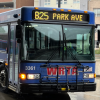As more people move to the Greater Boston area, there's more demand for housing, which means the cost of homes goes up. And housing experts say it’s partly up to the suburbs to develop more affordable housing to address that.
But when it comes to new developments in the 'burbs, the most hotly debated issue is density.
At a public hearing in Newton last week on a proposal for a huge new housing and commercial development, some community members who spoke said they see density as a solution to the city's housing problems. Dense housing, these residents said, creates a more vibrant community atmosphere, enables more use of mass transit, and helps reduce the city's impact on climate change.
But for others, even those who want to see more housing built, the question is — how dense is too dense? Opponents of the proposal said they are concerned the housing development would overwhelm surrounding communities and create a “traffic nightmare.”
Right now, one site that's proposed for development isn't much to look at. It’s a huge parking lot for the Riverside T stop at the end of the Green Line's D branch.
Randy Block and Liz Mirabile are members of a community association in Newton’s Lower Falls neighborhood, which is okay with this site being developed. But they're not happy with the scale of the proposal, they say.
"It brings an urban setting to a suburban town,” said Block.
“We have 499 housing units in all of Lower Falls, and 675 residential units are being considered for this development,” said Mirabile. “This [new development] is on 14.4 acres, and Lower Falls is on 200 plus acres.”
Newton's mayor, Ruthanne Fuller, said the city plans to require about 100 of the new development's units to be affordable. And in order to do that, the developers need to add more market-rate units to keep the project profitable.
"That tends to lead developers to have taller buildings and more units in one place,” said Fuller. “Plus, when you combine it with a place like Newton that has high land costs to begin with, the two together often mean that there are more units in one place than otherwise."
A study published last week by the Massachusetts Smart Growth Alliance says if Newton does allow the Riverside development and several other proposals, it will join a ring of cities and towns around Boston — including Chelsea, Somerville, Revere and others — that are seeing some growth in multi-family housing.
"There's been a movement to allow multi-family housing and our historic commercial centers, the town centers, village centers and downtowns," said the study’s author, Amy Dain.
But, she said, most of those developments were for 10 units here or 20 units there.
"In our region, there's demand for hundreds of thousands of new dwelling units," Dain said. And, she added, we’re not close to meeting that demand.
Housing economist Jeffrey Zabel of Tufts University said the only way we’re going to get there is if the state steps up and makes it happen.
A law called 40B pressures cities and towns to have 10 percent of their housing stock be affordable. As of 2017, less than 20 percent of Massachusetts cities and towns met that. And Zabel said one way to spur more affordable housing growth is to change that threshold.
"You could raise the percentage of affordable housing that that the towns would have to meet,” Zabel said. “Or you could loosen up the density restrictions that that towns have established to allow for higher density building."
Those density restrictions are set by the individual cities and towns. And to change that kind of zoning requires the support of two-thirds of the local government body — not just a simple majority, like most votes. Governor Charlie Baker wants to see that changed.
"There were a whole series of really good projects representing probably thousands of units of housing that all went down this spring, not because they weren't supported by a majority of whatever it was — town meeting, board of selectmen, city council — but because they couldn't get two-thirds," Baker said recently.
Baker is pressing for the state legislature to pass a bill that would allow local governments with a simple majority to make the kind of zoning changes necessary to build more dense housing developments.
For now, though, those zoning changes still require a two-thirds vote. And in Newton, to the relief of some and disappointment of others, it’s not clear if the city council can meet that high bar.





